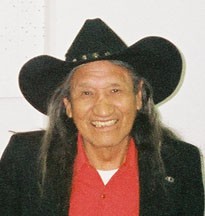
THE SELO HOUSE
We dedicate our first home in his honor
In Loving Memory of Selo Black Crow-July 23, 1932 - March 5, 2004
Our commitment to work toward well-being and spiritual healing of our people continues to be inspired by mentor Kangi Sapa Sun Dance Chief Selo Black Crow. A respected leader and hereditary Chief of the Oglala Lakota Oyate (People), Cheif Black Crow lived from 1932 to 2004 at Pine Ridge Oglala Lakota (Sioux) Reservation near Wanbli (Eagles), South Dakota. As a child he began learning about Lakota spirituality and ceremonies. With guidance of Nicholas Black Elk and his grandmother Rattling in the Water, he grew into a warrior, an expert horseman, bronco rider, and buffalo rancher. He served his country as a military paratrooper and pathfinder during the Korean War. He was decorated for his service.
Black Crow taught that if a man wanted to be a true warrior he must be able to cry, for only in knowing how to cry would a person learn compassion. In 1986, Black Crow, Leonard Crow Dog, and six other men brought the Sun Dance out of hiding to be returned to the Lakota People. This is when federal laws prohibited such religious practice among all Native Americans. Sacred White Buffalo Calf Woman, Grandmother Earth, and Unci (Grandmother) were his greatest influences. Throughout his life, Black Crow' conducted a Sun Dance every summer on his family's land near Wanbli.
In the tumultuous 1970s, Selo Black Crow gave spiritual guidance to the warriors of the Wounded Knee II comflict at Pine Ridge. He also negotiated the conflict's resolution. At one time he served as spiritual advisor to Leonard Peltier. Over the years, Black Crow worked with manyprison systems to gain religious and cermonial rights for prisoners in the United states and Canada. His efforts helped secure passage of the American Indian Religious Freedom Act 1978.